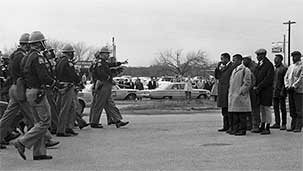I could listen to James Baldwin’s words, whether spoken by himself or a perfectly calibrated Samuel L. Jackson, for hours against an empty, black screen. Add to that the masterfully selected archival footage you provided director Raoul Peck, and what you get is a documentary that is near to perfect. But it is a profoundly disturbing and unsettling perfection, because it lays bare the chasm between the aspirations of a nation and its often ugly reality.
I Am Not Your Negro is a documentary that consists entirely of words written and spoken by James Baldwin, an African American academic and author who lived and wrote during the most tumultuous period of the American civil rights movement in 1950’s and 1960’s. He was a contemporary of Angela Davis, Huey Newton, Muhammed Ali, Malcolm X., Martin Luther King and Medgar Evers. The framing of the documentary revolves around a thirty page proposal for a book, to be titled Remember This House, that remained unfinished at the time of his death in 1987. The book was an attempt to chronicle the lives and deaths of Evers, Malcolm X. And MLK. The rest of the documentary uses that conceit to tell Baldwin’s own narrative, intertwined with archival footage of the three men in question.
Six years in the making, I Am Not Your Negro is a precise and often devastating deconstruction of the parallel worlds that white and black America have occupied for the entirety of the US’s history. The archival footage of the ugliness inflicted upon civil rights activists, as well as the assassinations of MLK, Malcolm X. and Evers, punctuate Baldwin’s observations about how America created and maintained a two-tiered society that pretended to one set of ideals, but often played out in much more sinister ways.
Born and raised in Harlem, before becoming an expat in Paris, and then finally returning to New York, Baldwin was a man built of contradictions. He was, for all intents and purposes, without religion, yet was both the son of a preacher and a former preacher himself. He was a gay, African American academic and author in a time where even saying that sentence in some parts of the country would court a beating or worse. He debated William F. Buckley to a standstill, and was the inspiration for literary figures like Toni Morrison and Ta-Nehisi Coates. Yet he is, for some, a complete cipher and largely unremarked.
Actively dismayed at the arbitrary and often damaging class distinctions that existed not only within the African American community, but the nation as a whole, Baldwin was, it seems, a cosmopolitan humanist with little of the usual loyalties to the church or established hierarchies. He saw himself as a witness, which meant he never really belonged to any one group but sought to see the larger picture—even while acknowledging that his experience was thoroughly grounded in the particulars of an African American man born near the middle of the 20th century. How could it not be? Baldwin also precisely articulated that it is incumbent upon the people who hold and exercise power as to how this will all shake out—while expressing his belief that the black-white divide is entirely a constructed thing, based on economic and class expediency: “White is just a metaphor for those that hold power”.
Watching this film was an often painful experience, especially when the sneering faces that were actively engaged in the beatings and murder of African American men and women could’ve belonged to an aunt or an uncle or a sister or brother of mine; people that look very much like me doing things that were utterly unconscionable. And overtop all of that was Baldwin’s often prescient observations about how these divides would never be healed without a kind of self-reflection that seems beyond most white Americans. But the brutal poetry of images and words, so completely in tune with one another, is what elevates I Am Not Your Negro above similarly constructed works. Especially since so much of the imagery jumped back and forth between historical and contemporary events-- and underscored how little real difference there was between Selma and Ferguson, the lynchings of young African Americans in the Fifties and Sixties, and their current treatment at the hands of the criminal justice system.
James Baldwin was a man of profound depth and a piercing intellect. He was possessed of a melancholic rage at what he saw every day in his country, but rejected the “white devil” rhetoric adopted by early Malcolm X. Instead he charged the American majority with a simple but difficult task: You say you’re decent, god fearing people, who believe in justice and liberty for all.
Now prove it.
The jury is still very much out.
Sincerely,

Tim






